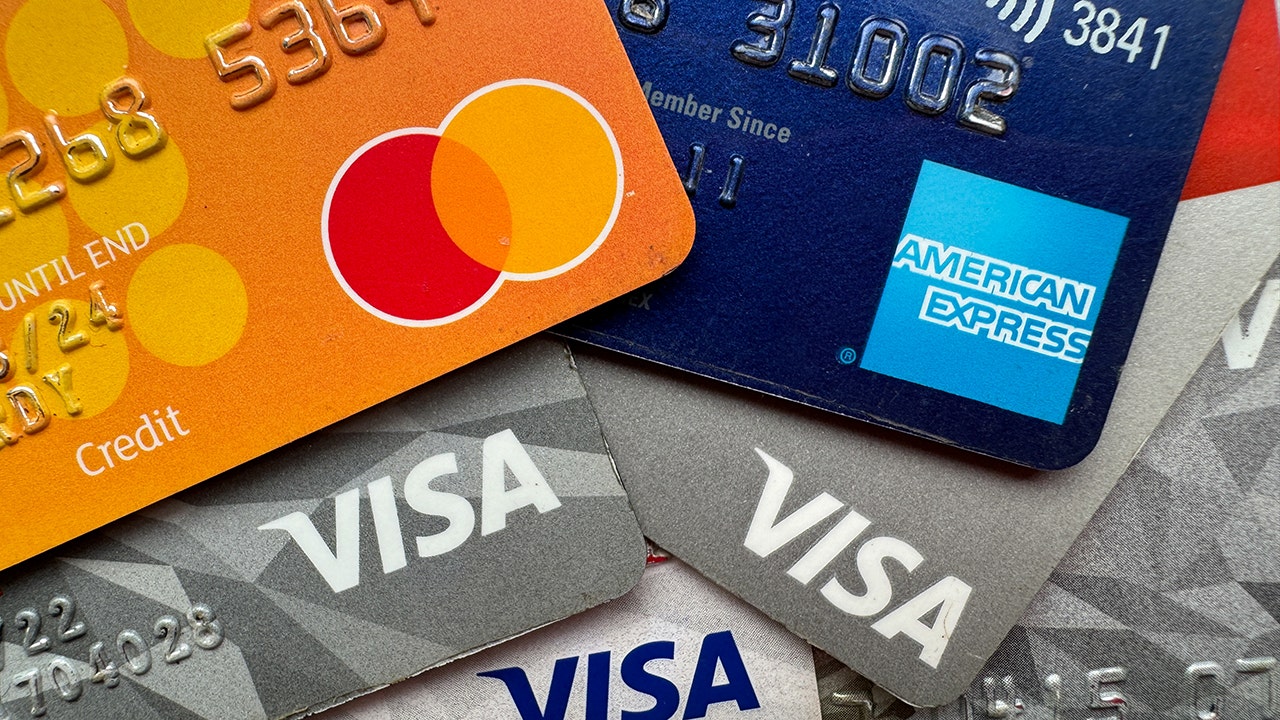Former St. Louis Federal Reserve CEO James Bullard unpacks rate cuts and the labor market on ‘The Claman Countdown.’
Wall Street and Main Street are ready to usher in the fall season with the first interest rate cut since March of 2020, the start of the COVID-19 pandemic, and with this comes the hope of lower borrowing costs.
While it may lower rates for mortgages, auto and personal loans, those carrying credit card debt are likely to be out of luck.
“That’s where the real advice is. Don’t expect the Fed to ride to your rescue”, Ted Rossman, Senior Industry Analyst at Bankrate, told FOX Business. “The change is not going to be that significant. My other big point is that a quarter point, half point, even if credit card rates fell a couple of points, it’s not that much of a difference. Just because rates are so high,” he warned.
Person inserting or removing Visa Credit Card using touch screen credit card payment at a Five Guys restaurant, Queens, New York. (Photo by: Lindsey Nicholson/UCG/Universal Images Group via Getty Images)
CREDIT COUNSELING DEMAND SURGES IN THESE STATES
The average annual percentage rate on standard credit cards is about 20.76%, according to Bankrate, with some in-store retail cards, such as Bloomingdale’s, as high as 31.99%.
Federal Reserve Chairman Jerome Powell, in August at the Kansas City Federal Reserve’s Jackson Hole Economic Symposium, set the stage for a September rate cut.
Jerome Powell, chairman of the US Federal Reserve, second right, arrives for dinner during the Jackson Hole economic symposium in Moran, Wyoming, US, on Thursday, Aug. 24, 2023. (Photographer: David Paul Morris/Bloomberg via Getty Images / Getty Images)
FED CHAIR POWELL REVEALS RATE CUT PLANS
“The time has come for policy to adjust,” Powell said. “The direction of travel is clear, and the timing and pace of rate cuts will depend on incoming data, the evolving outlook, and the balance of risks,” he added.
Nearly 70% of market participants are expecting a 25-basis point cut at the September 18 meeting, with a smaller 30.5% forecasting double that, as tracked by CME’s FedWatch Tool, which measures the probability of future rate moves.
| Ticker |
Security |
Last |
Change |
Change % |
| M |
MACY’S INC. |
15.57 |
-0.00 |
-0.01%
|
| V |
VISA INC. |
276.19 |
+1.85 |
+0.67%
|
| JPM |
JPMORGAN CHASE & CO. |
224.80 |
+2.59 |
+1.17%
|
| DFS |
DISCOVER FINANCIAL SERVICES |
138.73 |
+1.13 |
+0.82%
|
| COF |
CAPITAL ONE FINANCIAL CORP. |
146.93 |
+1.56 |
+1.07%
|
|
As an example, for those carrying a $1,000 balance on a credit card, a 25-basis point rate cut may lower your APR to 20.51% vs. 20.76%, according to Bankrate estimates. The drop in the monthly finance charge would be a paltry $0.21 less. Your minimum payment would like remain unchanged, as outlined by Greg McBride, chief financial analyst, Bankrate.
$1,000 Credit Card Balance, Current APR 20.76%
Rate Cut: 25 basis points
Monthly Finance Charge: $17.09 vs. $17.30
Minimum Payment: Likely unchanged
Even if policymakers stick to an easing cycle, it will still take a few rounds to make a meaningful difference.
401(K) MILLIONAIRES HIT NEW RECORD HIGH: FIDELITY
“The Fed’s going to be much slower, we think, on the way down than they were on the way up,” cautions Rossman.
Rather than wait for the Fed, Rossman suggests exploring other options.
“Maybe get a 0% balance transfer card or take out a side hustle. Cut your expenses. I mean, there’s other stuff you can do, but fed rate cuts, in and of themselves, aren’t going to make a big difference in the credit card world.”
GET FOX BUSINESS ON THE GO BY CLICKING HERE
The Fed will also meet in November and December to round out the 2024 year.

 Blog Post1 week ago
Blog Post1 week ago
 Economics1 week ago
Economics1 week ago
 Finance1 week ago
Finance1 week ago
 Economics1 week ago
Economics1 week ago
 Economics1 week ago
Economics1 week ago
 Personal Finance1 week ago
Personal Finance1 week ago
 Accounting1 week ago
Accounting1 week ago
 Economics1 week ago
Economics1 week ago











